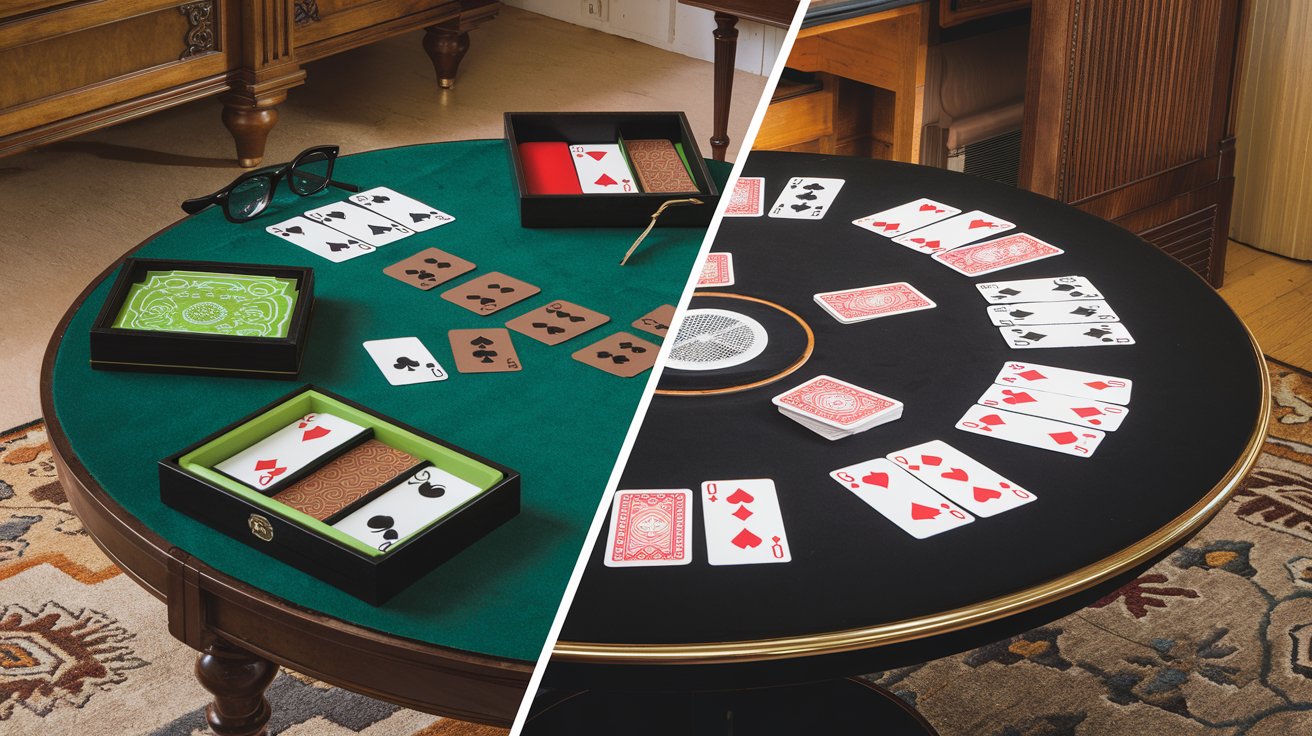Card games have been a staple of social gatherings and family nights for centuries. From the old classics like Poker and Bridge to newer games, the world of cards offers a vast range of experiences for players. Among these games, Rummy stands out as one of the most popular and widely enjoyed games across the globe. But what exactly makes Rummy different from other card games? Why is it so universally loved?
In this blog, we will compare Rummy to other well-known card games, highlighting its unique characteristics, strategies, and gameplay mechanics. By the end, you’ll have a clear understanding of what makes Rummy stand out in the world of card games and why it continues to captivate players of all ages.
What is Rummy?

Before we dive into the comparison, let’s first take a brief look at Rummy and its core mechanics.
Rummy is a matching-card game where the objective is to form valid combinations with your hand of cards. These combinations can be sets (three or four cards of the same rank, but different suits) or runs (three or more consecutive cards from the same suit). The player who manages to arrange all their cards into valid sets and runs first is the winner, signaling the end of the round. The game typically uses a standard 52-card deck, but depending on the variation, additional cards (like jokers) may be introduced for more flexibility and strategy.
Rummy can be played in several formats, including Indian Rummy, Gin Rummy, Kalooki, and Oklahoma Rummy, each with slight variations in rules but sharing the core concept of forming sets and runs.
What Sets Rummy Apart from Other Card Games?
Rummy is unique in many ways. Let’s explore how it compares to other popular card games, such as Poker, Bridge, Hearts, and Spades, based on gameplay, strategy, and objectives.
1. Objective and Gameplay Mechanics
Rummy:
- The core objective of Rummy is to form sets and runs using the cards dealt to you. Players need to arrange their cards into valid combinations, using either their own dealt cards or by drawing from the deck and the discard pile.
- The game is flexible, and players can choose different strategies, like focusing on forming runs or sets. The use of jokers (wild cards) also adds an element of strategy, as they can substitute for any card to complete a set or run.
Poker:
- Poker is a betting game where the objective is to form the best possible hand (combination of cards) from the dealt cards. The hand rankings include a Royal Flush, Straight Flush, Four of a Kind, Full House, and more. Poker combines skill, strategy, and luck with a significant focus on betting rounds and bluffing.
- Unlike Rummy, where players form combinations, in Poker, the combinations are based on predefined hands, and the winner is determined by the best combination of cards, as well as the betting strategies.
Bridge:
- Bridge is a trick-taking game played in partnerships. The game is played with 52 cards, and the objective is to win tricks (sequences of cards played in each round) by having the highest-ranking card in a particular suit or trump suit.
- Unlike Rummy, where players focus on forming valid combinations, Bridge focuses on tactics, bidding, and winning tricks. It involves communication between partners, adding a unique layer of complexity.
Hearts:
- Hearts is a trick-taking game where players aim to avoid specific cards (the Hearts and the Queen of Spades) in each trick. The player with the least points at the end of the game wins.
- While Bridge and Hearts involve trick-taking and have an element of strategy based on timing and card management, Rummy focuses on forming valid sets and runs, which can be done at any point in the round.
Spades:
- Spades is another trick-taking card game, but players must predict how many tricks they will take based on their hands and use the spades suit as the trump suit. The objective is to win as many tricks as possible.
- Like Bridge and Hearts, Spades relies heavily on timing and team-based strategies, whereas Rummy is an individual game focusing on card combinations.
Key Difference:
- While Rummy focuses on forming combinations (sets and runs), Poker, Bridge, Hearts, and Spades are more about winning tricks or hands based on predefined rules and ranks.
2. Skill vs. Luck: How Strategy Influences the Game

Rummy:
- Rummy is a strategy-based card game, where skill plays a significant role in how well you do. Players must analyze their cards, keep track of discarded cards, and adjust their strategies accordingly.
- The element of luck is present in the initial card deal and the draw of cards from the deck, but strategic thinking is crucial for arranging cards efficiently and making smart decisions about when to draw or discard.
Poker:
- Poker combines luck, skill, and psychology. While there is an element of luck in the cards dealt, the bluffing aspect is unique to Poker. Skilled players can manipulate the game by reading opponents and making strategic bets, adding a psychological layer to the game.
- Luck does play a role, especially in the early hands, but players rely heavily on their knowledge of the game and their ability to read opponents.
Bridge:
- In Bridge, skill is paramount. Since the game is played in partnerships, players must communicate effectively with their partners, predict the opponents’ moves, and strategize to win tricks.
- Luck comes into play when cards are dealt, but experienced players rely on bidding strategies, memory, and team dynamics to win.
Hearts:
- Like Bridge, Hearts requires skill in card management, timing, and prediction. Players must avoid certain cards while trying to minimize their score. Strategy comes in when to “shoot the moon” (take all the points) or how to avoid penalty cards.
- Luck is present when cards are dealt, but players’ strategies largely determine the game’s outcome.
Spades:
- Spades involves skill in bidding and trick-taking. Players must estimate how many tricks they will take and adjust their strategy to maximize their chances. Luck influences the cards dealt, but the ability to predict and outplay your opponents is critical to success.
Key Difference:
- Rummy focuses more on card combination strategies, while games like Poker, Bridge, and Hearts include elements of psychological gameplay (bluffing, bidding) that make them unique.
3. Game Duration and Pace

Rummy:
- Rummy games tend to be fast-paced, with each round lasting only a few minutes. Players are continuously making decisions and adjusting strategies as they draw and discard cards.
- The game ends when a player successfully forms all their cards into valid sets and runs, making the rounds quick and dynamic.
Poker:
- Poker rounds can vary in length. In games like Texas Hold’em, the game proceeds through several stages of betting and card dealing. This process can take longer than a typical Rummy round because of the betting phase.
- The poker face and psychology play a significant role, often elongating the rounds as players consider their options carefully.
Bridge:
- Bridge is typically longer, as it involves multiple rounds of trick-taking, bidding, and communication. A complete game can take an hour or more.
- The structure of Bridge is much more complex, involving more strategic planning and cooperation between partners.
Hearts:
- Hearts can vary in duration, depending on the number of players and the level of experience. However, it is typically a longer game compared to Rummy because of its trick-taking structure.
Spades:
- Like Hearts, Spades is played in rounds, which can take a longer time to complete, especially if players are engaged in bidding and strategy discussions.
Key Difference:
- Rummy is a quicker, more dynamic game that focuses on card combinations and strategy, while games like Poker, Bridge, and Spades may take longer due to betting phases, bidding, and trick-taking.
4. Simplicity vs. Complexity
Rummy:
- Rummy is relatively easy to learn and play, making it accessible to beginners. The basic rules are simple: form sets and runs, draw, and discard cards.
- However, the deeper strategies, such as when to draw from the discard pile and how to manage your hand, make the game more complex as you gain experience.
Poker:
- Poker is known for its complexity, especially for beginners. While the basic rules are easy to grasp, betting strategies, bluffing, and hand rankings require a deep understanding of the game.
- The addition of psychology and reading other players adds another layer of complexity.
Bridge:
- Bridge is considered one of the most complex card games. It involves detailed bidding, communication between partners, and strategic trick-taking.
- Learning Bridge can be challenging, and the game requires careful attention to team dynamics and contracting.
Hearts:
- Hearts is fairly simple to learn and plays quickly. The challenge lies in predicting the best time to take tricks and avoiding penalty cards. The gameplay complexity increases with the number of players.
Spades:
- Spades is easier to pick up than Bridge but can still be complex due to the bidding and trick-taking structure.
Key Difference:
- Rummy offers a balance of simplicity and strategic depth, while games like Poker and Bridge can be more complex and involve deeper strategy, psychology, and partnership dynamics.
Conclusion: Why Rummy Stands Out
Rummy holds its unique place in the world of card games for a variety of reasons. Its focus on forming sets and runs offers a straightforward yet strategic game experience, making it enjoyable for both casual players and more experienced strategists. Unlike other card games such as Poker, Bridge, or Spades, Rummy doesn’t rely heavily on bluffing, betting, or complex teamwork. Instead, it allows players to focus on the art of card arrangement and pattern recognition, making it a perfect choice for those who appreciate pure strategy.
Its simple rules combined with the ability to incorporate jokers for added flexibility make Rummy a dynamic game for players of all ages. Whether you’re playing a quick round with a friend or settling in for a longer game with family, Rummy offers the perfect balance of speed, strategy, and fun. It’s no wonder this classic card game continues to captivate players worldwide.
So, if you enjoy card games that involve a combination of strategy, quick thinking, and the excitement of forming combinations, Rummy is a game that should be at the top of your list.

Zareb Saleh is a journalist at Gulf Today and a ghostwriter for Gameoholic, specializing in gaming, technology, and digital culture. With a keen eye for industry trends, he delivers insightful stories that engage and inform readers.




